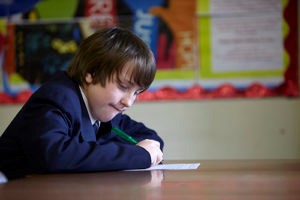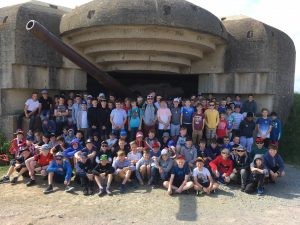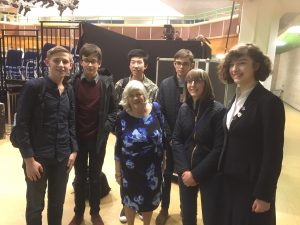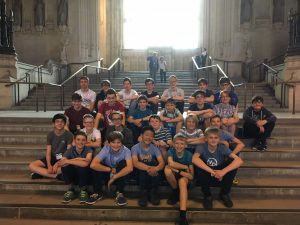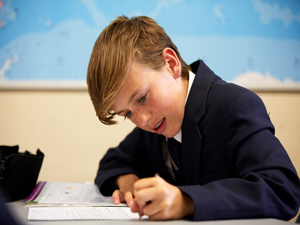History & Politics
Head of Department: Miss J. Bradbury
The future is dark, the present burdensome; only the past, dead and finished, bears contemplation. Those who look upon it have survived it: they are its product and its victors. No wonder, therefore, that men concern themselves with history.
G. R. Elton, The practice of history (1967)
The department is passionately committed to the belief that an understanding of history is a vital prerequisite to the life of an active citizen. No one can hope to develop an informed understanding of the world they live in without at least some knowledge of the past, of how we got where we are. As a school, our mission statement is clear in that we want to provide our students with the knowledge and skills to respond to a changing world with confidence and humility and that they become reflective, open-minded and principled individuals who will make a positive contribution to their community and the wider world.
As teachers, we all feel very passionate about achieving those goals and it is reflected in the range of opportunities that students are provided with beyond the curriculum to learn and engage with the wider world; but it is also imperative that we use the National Curriculum to ensure that our students have a solid bedrock of knowledge of our country’s history and that of the wider world, so that the mistakes of the past will never be forgotten nor repeated.
Moreover, the study of history is not only an end in itself, but provides all students with skills (such as analysis, synthesis, communication and research) which will equip them to perform well in a large number of academic and vocational contexts.
Programme of Study
It was our determination at key stage 3, that our curriculum needed to be as representative as possible across the three years of study, as that would give our students a sound basis for their future history studies if they elected to continue with the subject, but, more importantly, provide a clear groundwork in helping our students become reflective, open-minded and principled individuals as our mission statement strives for.
Year 7
Students will investigate how England came to be united under Saxon rule, and what the limits of this rule were in the British Isles. They will study the development of the early empires of the UK including the Norman Conquest and Angevin Empire, going on to the role of religion in English society that culminates in a study of the English role in the Crusades, where students look at religious and racial prejudice leading to the judgement that the Crusades were in fact invasions.
The students then look at the concept of rights and how politically England developed, followed by a brief study of the Tudors. This includes a study of local History, in particular, the role of Devon mariners in the Spanish Armada, but also the creation of the slave trade.
Year 8
In year 8, we continue this focus on diversity and rights which leads into a detailed evaluation of the unsavoury role of colonialism and empire in English History, along with the development of the political rights. Students study the political evolution of Britain and the paternalistic attitudes towards women during the Industrial Revolution and early stages of the twentieth century. Students will also learn about the changes Britain underwent in the Industrial period, and what it was like to work in the most economically advanced country in the world. They will examine British views of the French Revolution and consider the importance of this event in how Britain’s democracy evolved in the 19th century.
Finally, students spend one whole term studying the British Empire and the Slave Trade. Again, we make links to their studies of the Elizabethan mariners in year 7 but then study the slave trade all the way through to abolition, highlighting key individuals of all ethnicities in the struggle for abolition. In preparation for their studies in year 9, students then look at the crimes committed throughout the Empire, in particular, the Boer War and the suppression of India.
Year 9
After understanding the context of Empire in year 8, students will consider whether they think the century dominated by two world wars should be remembered as one that was primarily dominated by conflict. They will be able to explain the causes of the two wars, their key events, impact on British civilians and compare measures taken to stop conflicts in their wake.
They will assess the role of the British Empire in those conflicts and how the Empire turned into the Commonwealth. Students will investigate the holocaust and other genocides and come to conclusions about how and why genocide sometimes occurs in wars.
They will examine the growth of new ideologies in Europe and their impact on countries abilities to cooperate. They will come to conclusions about how far the nature of the Cold War differed from other conflicts. Finally, they will investigate modern conflicts to identify common causes and outcomes to examine the role and limitations of the UN in peacekeeping today.
GCSE
Examination Board: AQA
Pupils will complete two written exams for GCSE. In year 10, pupils will focus on British History and will study Britain and the world. The AQA unit that the students’ study is called Migration, Empire and the People, which addresses the significance of migration to and from Britain, covering a timescale from the Viking invasions to Brexit.
Within this unit of study, students look again at the slave trade and the way the British governments advocated their imperialistic views. The unit also addresses the prejudices towards BAME citizens, including a study on the attitudes towards the Windrush Generation and the appalling Rivers of Blood speech by Enoch Powell.
It also includes studies of key individuals throughout the period such as Olaudah Equiano, Mary Seacole and Bernie Grant, whilst at the same time also studying those white individuals who played an active role in British imperialism such as Sir John Hawkins and Cecil Rhodes and giving the students the opportunity to address the shameful practices of the British Empire. This unit of study also allows us to address the growing rise in religious prejudices, in particular anti-Semitism, and the rise of far right extremism, culminating in students looking at the murder of Jo Cox before the Europe Referendum.
The second aspect is a depth study of Elizabethan England. This unit covers the entirety of Elizabeth’s reign and takes a deep dive into her religious, economic and foreign policy. Students learn about why the reign of Elizabeth is considered a ‘Golden Age’ with a key focus on the development of culture and architecture of the time. As part of this unit, students have the opportunity to complete a historical site visit in preparation for the exam. The previous sites include Hardwick Hall, the Globe Theatre and Kenilworth Castle.
In year 11, the focus switches to Modern History and again students will study two aspects. Firstly, students will study Germany from 1890 to 1945, considering how Germany developed post-unification, its involvement in World War and the resulting collapse of the new Weimar democracy. The study then looks at the resulting rise of the Nazi Party and its maintenance of power, including the role of propaganda and terror. The final aspect to be studied is Conflict and Tension in Asia, 1950-1975, where students will study the Korean and Vietnam War and its impact the social and political climate at that time. This unit is particularly popular as it draws upon students’ studies of the Cold War in year 9 and leads to numerous political discussions based on current international relations between the US and countries such as China and Russia.
Sixth-Form History (AQA & IB)
At A Level, students have the opportunity to study two key periods in History over the two years. They will study the History of the Tudors, and the Russian Revolution and rule of Joseph Stalin. At the end of year 13, students will then sit an exam on each. Students also study the History of African Americans and the push for Civil Rights across a 100-year period as part of their non-examined assessment Historical Enquiry which is a 4,000-word essay.
At IB, students cover a wide range of History. Students will study the causes, effects and practices of Global War in the Twentieth Century and authoritarian states which includes the USSR, China, Germany and Italy. Those that are completing the Standard course, will complete two exams and Higher students will complete three. All students will complete a brief Internal Assessment on an aspect of History of their choice.
IB Global Politics
Students study four main themes, covering Peace and Conflict, Power and Sovereignty, Development and Human Rights. Both standard and higher students complete two exams as well as an Engagement Activity where they have to become engaged to a political aspect such as Health, Representation and the Environment.
History & Politics Society
Students across the Key Stages get involved in two societies that takes place every week. In Politics Society we have been very fortunate to have outside speakers in such as Kevin Foster MP, Ben Bradshaw MP, Councillor Swithin Long and Ann Widdecombe. In History Society, students have been busy creating Anglo-Saxon goblets out of cow horns and building Roman shields. Each year we also run a joint History and Politics Society trip to London to visit the British Museum and the Houses of Parliament.
Extra-Curricular Activities
It is very important that students have the opportunity to experience history outside of the classroom. Therefore, the Department runs numerous trip across the academic year. Typical trips include a GCSE historical site visit to Montecute House to look at Elizabethan England, the Battlefields trip, where students visit key World War One battlefields and finally our annual year-7 trip to Normandy. On this trip we take most of year 7 to visit the D-Day beaches and museums, but also, to extend their knowledge of William the Conqueror, visit Falaise Castle and the Bayeux Tapestry.
Useful Links
Probably the best site for students is Active History (students have the login details to access the site), which has loads of information, resources and links. Also superb for information is the Spartacus site which covers almost any subject you could be interested in. The BBC has a lot of useful information on its history site and on the BBC History Magazine site as well.

